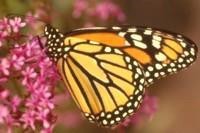Monarch Butterfly

Among the most recognized butterflies in the world, the Monarch makes an amazing journey of over 3,000 miles from southern Canada to Mexico every fall and back each spring. The Monarch is the only butterfly known to make this dual trip journey back and forth. This butterfly is distinct and easy to recognize with its dark orange wings, black stripes, and white spots. The caterpillar is also very distinctive with its black, white, and yellow alternating stripes and two pairs of black antennae structures, one antenna in the front and a decoy set in the back to confuse predators. Monarch butterflies primarily feed on milkweed species and close relatives such as dogbane. The sap of milkweed plants is toxic to most animals, except the Monarch, which stores those toxins to make themselves taste bad so most animals won’t eat them. Monarch butterflies were recently added to the endangered species list as the population has declined 22-72% over the last decade.
You can help the Monarch butterfly population in your area in several ways. The first is to plant milkweed plants, and several varieties work other than the Common Milkweed. If you have the room, you can develop a Monarch Waystation. More information on the Monarch Waystation project can be found here. Another way to help butterflies of all kinds is to add water sources in your backyard that are shallow enough for the butterflies to use and provide a mix of food sources. If you must use pesticides, try to do so early in the morning or late in the evening to avoid hurting pollinators as much as possible. Organic chemicals are no less harmful to pollinators when compared to synthetic chemicals. Monarchs are genuinely one of the jewels of the butterfly world, and hopefully, we can help stabilize or even increase their population by making a few changes in our homes.

Have questions? Contact our office where our Horticulture Extension Agent will assist you with questions.
Phone: (316) 321-9660
Email: callae@ksu.edu